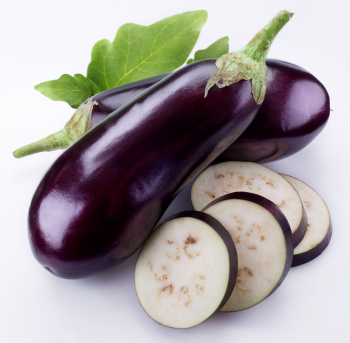By Michelle Imbert
CSMS Magazine Staff Writer
While most people know of eggplant for the delicious marinade, there are many other ways it can be served. The recipe that follows is a prime example.
First, one has to have one 1 1/2 – pound eggplant to get started. Below is the rest that follows.
Kosher salt
3 tablespoons extra-virgin olive oil
1 small red onion, sliced
1 tablespoon drained capers
1 tablespoon chopped kalamata olives
1 tablespoon aged balsamic vinegar
½ cup tomato sauce or puree
Freshly ground pepper
40 thin toasted baguette slices, for serving
1 tablespoon chopped basil
Quarter the eggplant lengthwise. Scoop out the very seedy parts and discard. Cut the remaining eggplant into 1/2 – inch dice. In a colander set in the sink, lightly salt the eggplant cubes and toss well. Top with a sturdy plate weighed down with a heavy can and let drain for 1 hour. Rinse eggplant cubes and pat dry.
In a large skillet, heat 1 tablespoon of the oil. Add the eggplant and cook over moderately high heat. Stirring occasionally, until tender, about 5 minutes. Transfer the eggplant to bowl.
Add the onion and the remaining 2 tablespoons of oil to the skillet and cook over moderately low heat until the onion is tender, about 6 minutes return the eggplant to the skillet. Stir in the capers, olives and balsamic vinegar and cook until the vinegar had evaporated. Add the tomato sauce and cook over low heat, stirring, until thickened, about 2 minutes. Season with salt and pepper and transfer to a bowl to cool.
Shortly before serving, spread the caponata on the baguette toast and garnish with the basil. – Elena Bisestri
Make ahead: the caponata can be refrigerated for up to 3 days.
Wine, lively, fruity Merlot.
Historical facts
Eggplant was originally introduced to the United States in 1806 by President Thomas Jefferson, who was also an experimental botanist. This deep purple vegetable offers a unique taste and a plethora of preparation and cooking options – as well as intriguing health benefits! Consider these five good reasons to add eggplant to your monthly menu.
Antioxidants
Eggplant is considered one of the top five antioxidant foods. Our environment is filled with free radicals that get into our bodies and accelerate the aging process. Some free radicals also increase the risk of some types of diseases.
Antioxidants bind with free radical molecules, effectively removing them from the body. A diet rich in antioxidants has been shown to reduce the risk of some types of cancer. Antioxidants also act as an antimicrobial that could prevent a number of other illnesses as well.
Cholesterol Regulation
Eggplant also contains chlorogenic acid, which has been shown to lower LDL (bad) cholesterol in some circumstances. While the evidence of this benefit has not been proven fully in clinical trials, the other nutritional benefits of eggplant make it a good choice for this purpose as well. Chlorogenic acid is also considered a good antioxidant that acts as an anti-cancer, antimicrobial and antiviral agent in addition to its potential for affecting cholesterol levels.
Fiber Enhancement
Eggplant is rich in fiber, which provides numerous health benefits. Fiber-rich foods have been found to be beneficial to the heart and cardiovascular system, the digestive system and weight management. The American Diabetes Association recommends eggplant in the diet to help manage type II diabetes, due to its high fiber and low fat content. A single cup of eggplant contains almost 10% of your recommended daily fiber intake.
Nutrient Rich
It may seem like the antioxidants, fiber and cholesterol-regulating ingredients would be enough reasons to try new eggplant dishes. However, we aren’t done yet! This single vegetable also provides a high content of minerals like potassium, manganese, copper and magnesium. Vitamins included in this vegetable include thiamine, vitamin B6 and niacin.
This is a powerful punch of nutrients indeed, particularly when you consider that a full cup of eggplant only contains 27 calories as well. In fact, some nutrient tables show eggplant with as many as 80 nutrients in a single serving.
Note: Michelle Imbert lives and works in Philadelphia. She is a new member of the CSMS Magazine family.


